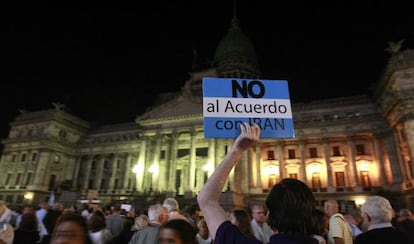Iranian agreement to probe 1994 terrorist bombing divides Argentina
Jewish community and opposition lawmakers protest joint investigation


Argentina’s initiative to allow Iran to join an investigation into the 1994 deadly terrorist bombing of a Jewish community center in Buenos Aires has divided the country, with thousands of Argentineans demanding that the agreement be rescinded.
On February 28, legislators voted to approve an agreement to set up a truth commission to investigate who was behind the car bombing attack on the center, which left 85 people dead and more than 300 injured.
For 19 years, Jewish community leaders have been demanding a transparent investigation. In 2006, prosecutors Alberto Nisman and Marcelo Martínez Burgos formally accused the government of Iran of planning the attack and Hezbollah of carrying it out. The prosecution’s filing of charges was an important step since it allowed Interpol to issue a red alert warning for the five suspects named in the Argentinean indictment. Among the suspects is Ahmad Vahidi, Iran’s current defense minister, who at the time was a commander of a special unit of Iran’s Revolutionary Guards.
The other four named were Ali Fallahian, former information minister; Mohsen Rezaee, a former government advisor; Moshen Rabbani, the then-attaché of the Iranian Embassy in Buenos Aires; and Ahmad Reza Asghari, a former official.
Until now, Iran had denied any involvement and refused to allow any of the former officials to be subjected to questioning by Argentinean prosecutors or courts. But on January 27, Argentinean Foreign Minister Héctor Timerman signed a memo of understanding (MoU) with his Iranian counterpart calling for a joint investigation into the incident.
What good is it if Argentinean judges are not allowed to travel to Iran?"
The signing sparked outrage — not only among local Jewish community leaders, but also in Israel, which sent a diplomatic note of protest to Buenos Aires reminding President Cristina Fernández de Kirchner that the United Nations has isolated Iran.
“In a country of 40 million people, Jews only account for about 200,000,” explained Argentinean journalist Pepe Eliaschev. “The Jewish community for the most part has been a natural ally of the Fernández de Kirchner government because it sides with its human rights policy. But after this, nothing will be the same.” On the same day Timerman signed the MoU, the president praised the agreement via 19 posts on her Twitter account.
All Argentina’s opposition parties have rejected the MoU. Timerman explained to lawmakers that before the agreement was hammered out, no Argentinean judge could even question any of the suspects.
“What good is it if Argentinean judges are not allowed to travel to Iran or cannot order any suspect held in preventive custody?” asked Julio Schloser, president of the Argentinean Israeli Association, who added that there is no deadline as to when the commission will be created.
Some opposition deputies believe that there is a business side to this agreement. They say the government wants Iran to invest in oil company YPF, which was left without major financing after Fernández de Kirchner nationalized the Spanish Repsol affiliate last year.
When asked why her government signed the MoU with Iran, Fernández de Kirchner responded: “First because I am a person who wants to tackle a problem head on.”
She then told lawmakers she wants “to finally uncover the truth,” and stated that if the MoU had not been signed, the case would have remained unsolved.
Tu suscripción se está usando en otro dispositivo
¿Quieres añadir otro usuario a tu suscripción?
Si continúas leyendo en este dispositivo, no se podrá leer en el otro.
FlechaTu suscripción se está usando en otro dispositivo y solo puedes acceder a EL PAÍS desde un dispositivo a la vez.
Si quieres compartir tu cuenta, cambia tu suscripción a la modalidad Premium, así podrás añadir otro usuario. Cada uno accederá con su propia cuenta de email, lo que os permitirá personalizar vuestra experiencia en EL PAÍS.
En el caso de no saber quién está usando tu cuenta, te recomendamos cambiar tu contraseña aquí.
Si decides continuar compartiendo tu cuenta, este mensaje se mostrará en tu dispositivo y en el de la otra persona que está usando tu cuenta de forma indefinida, afectando a tu experiencia de lectura. Puedes consultar aquí los términos y condiciones de la suscripción digital.








































